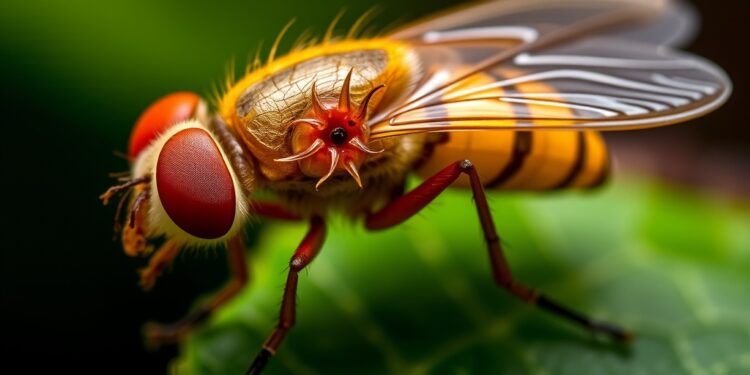
A recent study published in the esteemed journal PLOS Biology has unveiled a shocking relationship between a fungal infection and neurodegeneration in fruit flies. Researchers from the University of Birmingham discovered that the fungus Beauveria bassiana can manipulate the fruit fly’s immune system, leading to the destruction of critical brain cells and, ultimately, a shortened lifespan for the infected insects. This research not only highlights the intricate interplay between pathogens and host immune responses but raises important questions about the implications of such mechanisms in broader biological contexts.
The fruit fly, a common model organism in genetic studies, has provided scientists with valuable insights into many biological processes, including development, behavior, and disease. In this latest research, the focus on neurodegeneration sheds light on how vulnerabilities in the immune system can be exploited by external pathogens. Notably, the study reveals that after being exposed to B. bassiana, a significant number of flies exhibited alarming signs of neurodegeneration within just a few days. More than half of the infected flies perished after seven days, a stark contrast to the control group, which lived for nearly 50 days under similar conditions without infection.
The researchers’ experimentation began by placing fruit flies in controlled infection chambers. Upon contact with B. bassiana, the fungus was found to penetrate the blood-brain barrier — a crucial protective barrier separating the brain from the bloodstream. This invasion permitted the fungus to infiltrate the central nervous system, where it initiated a cascade of destructive immune responses. The findings point to a complex interplay between the host’s defenses and the strategies employed by the fungal pathogen to evade them.
At the heart of this process are Toll receptors, a family of proteins that play a pivotal role in the innate immune response of many organisms, including flies and humans. The study indicated that B. bassiana outsmarted the fruit fly’s immune system by triggering two seemingly contradictory responses from the Toll-1 receptor. Initially, the receptor activated the release of antimicrobial peptides, which are essential for fighting off pathogens. However, the fungus also manipulated the receptor to induce the production of a protein called Sarm, which paradoxically suppresses immune activity while simultaneously promoting the death of brain cells.
Professor Alicia Hidalgo, who led the study, articulated the remarkable strategy employed by the fungus. She noted that it has evolved methods to deceive the immune system, initially prompting a typical immune response that is beneficial for the host. Yet, in the context of brain cells—where the stakes are vastly higher—the fungus exploits this reaction to activate a pathway that results in neuronal loss. This duality of response illustrates a sophisticated evolutionary strategy, highlighting the potential for pathogens to not only invade but also to fundamentally alter host biology.
While discussing the broader significance of their findings, Dr. Deepanshu Singh emphasized the evolutionary arms race between hosts and pathogens. In nature, hosts continuously adapt and enhance their immune systems to fend off infections, and in turn, pathogens develop new strategies to circumvent these defenses. This dynamic interplay is a hallmark of evolutionary biology, and the findings concerning B. bassiana and fruit flies provide a compelling example of how such interactions unfold at the molecular level.
Importantly, the researchers emphasized that B. bassiana is not pathogenic to humans; it is an insect-specific fungus. However, the implications of this research stretch far beyond fruit flies. The underlying mechanisms by which fungal infections could potentially affect neurological function in various organisms indicate a need for further exploration. The study opens up avenues for understanding how similar pathogenic strategies could be at play in other fungal infections known to affect mammals, including humans.
The research also presents vital insights for the field of neurodegenerative diseases, linking immune responses and cell death in new ways. By elucidating how fungal pathogens can exploit innate immune responses, this study challenges researchers to reconsider how external infections might influence neurological health. The anticipation of how such findings can translate to human health dynamics is both exciting and alarming, urging the scientific community to remain vigilant.
Future explorations may unveil more secrets about the interaction between neurodegeneration and immune responses across various species, including humans. As this field of research evolves, it may not only enhance our understanding of infectious diseases but also inform treatment strategies for neurodegenerative conditions by tackling the immune system’s role in cell death. Moreover, such discoveries could lead to the identification of novel therapeutic targets that could mitigate the effects of infections and bolster neuronal resilience.
In conclusion, the study underscores the necessity for continued interdisciplinary research that bridges immunology, neurology, and evolutionary biology. As science continues to uncover the layers of complexity within biological interactions, it is imperative to recognize the roles of both host and pathogen beyond simplistic narratives. The fruit fly’s plight against B. bassiana not only serves as a cautionary tale but also as an invitation to decode the multifaceted relationships that govern life itself.
Subject of Research: Animals
Article Title: Toll-1-dependent immune evasion induced by fungal infection leads to cell loss in the Drosophila brain
News Publication Date: 13-Feb-2025
Web References:
References:
Image Credits:
Keywords: Fungal pathogens, Fungal infections, Neurodegenerative diseases, Immune receptors, Brain evolution, Blood brain barrier, Cell death, Glia
Tags: Beauveria bassiana impact on healthbiological implications of neurodegenerationfungal infection effects on immune systemgenetic studies using fruit flieshost-pathogen interactions in insectsimmune response manipulation by fungilifespan reduction in infected fruit fliesmodel organisms in disease researchneurodegeneration in fruit fliesneurodegenerative mechanisms in insectspathogens and immune vulnerabilitiesPLOS Biology research findings





